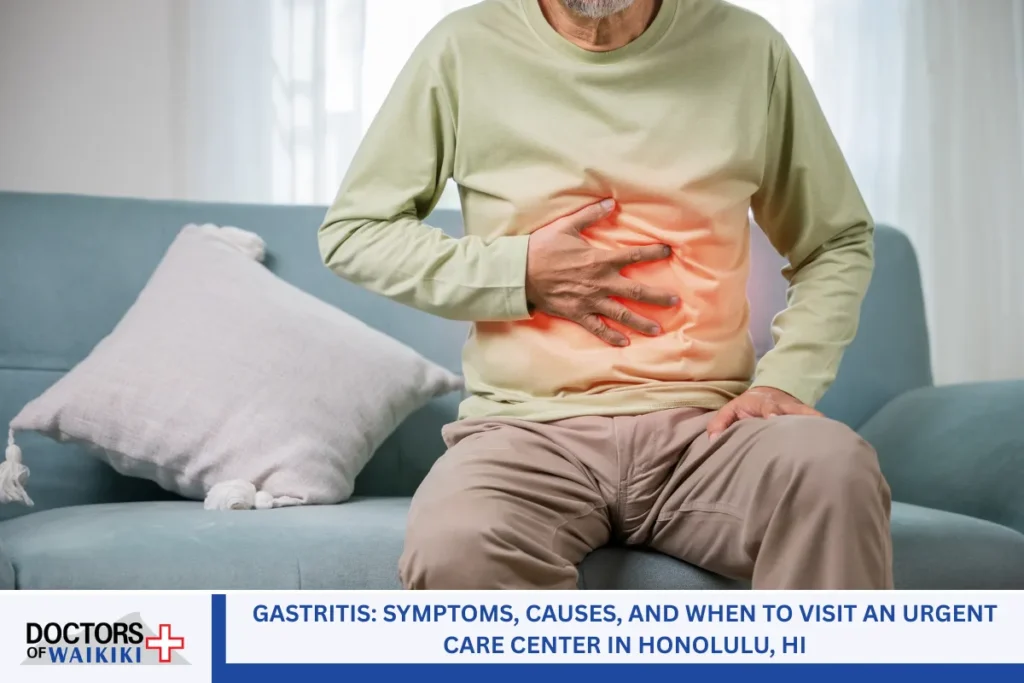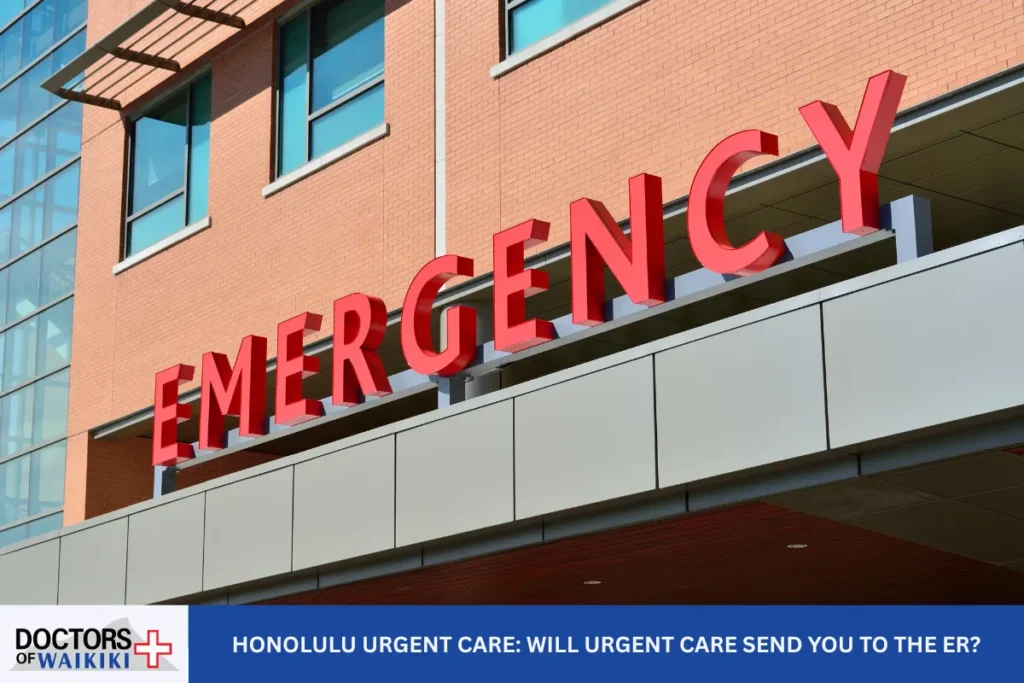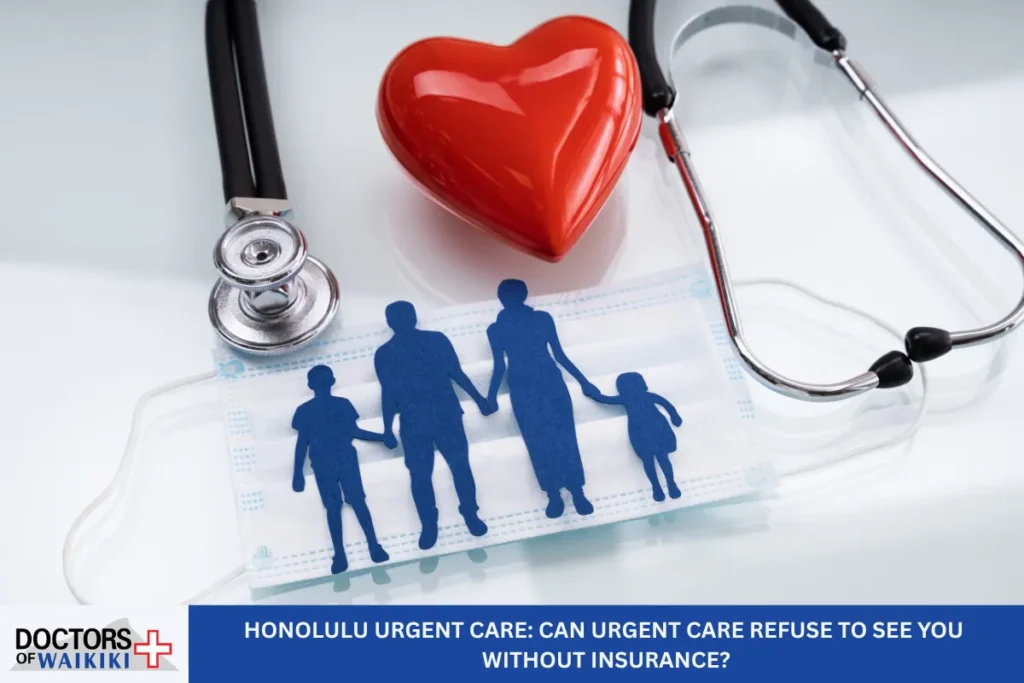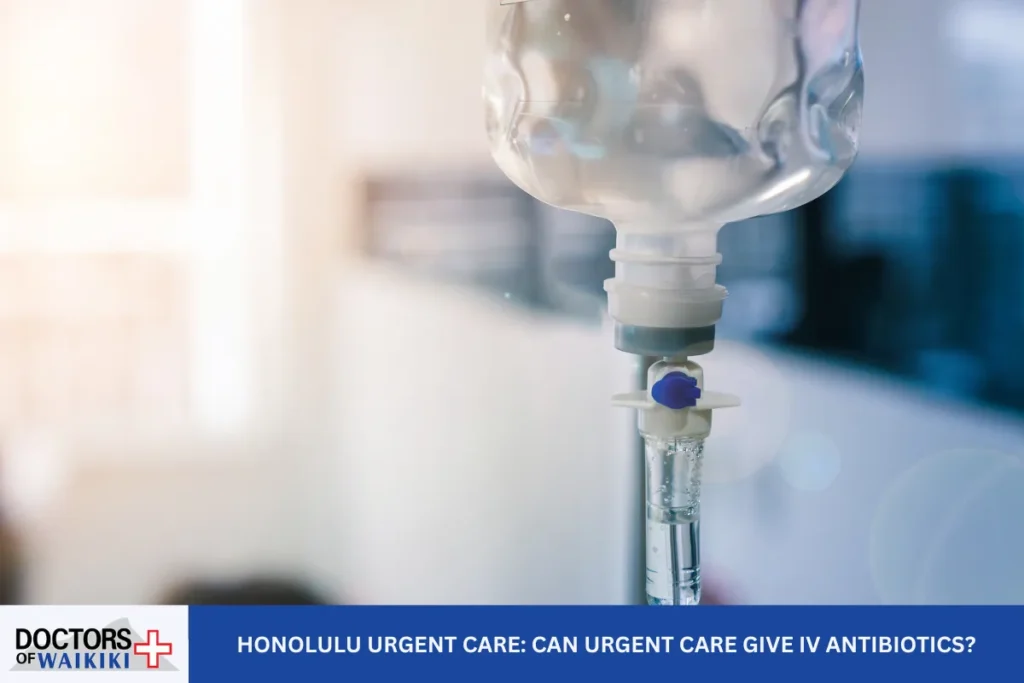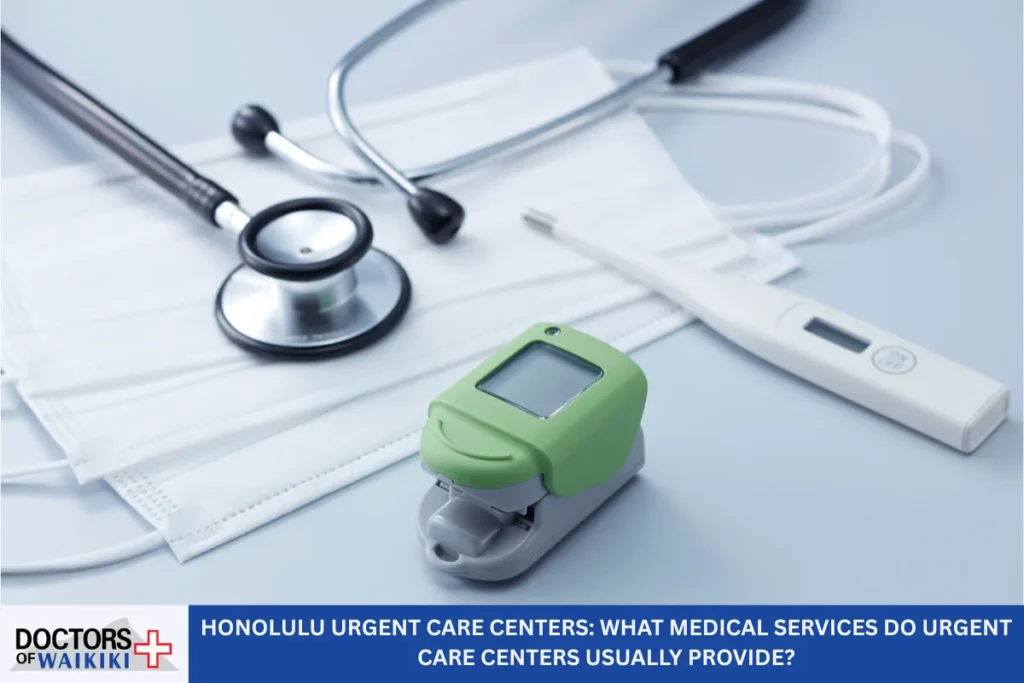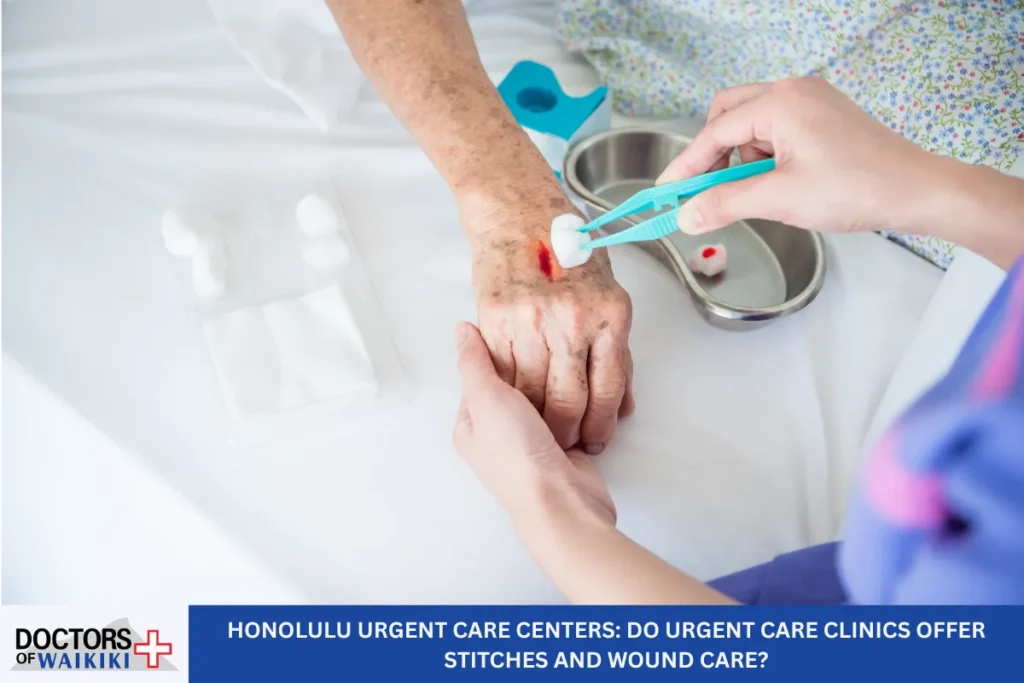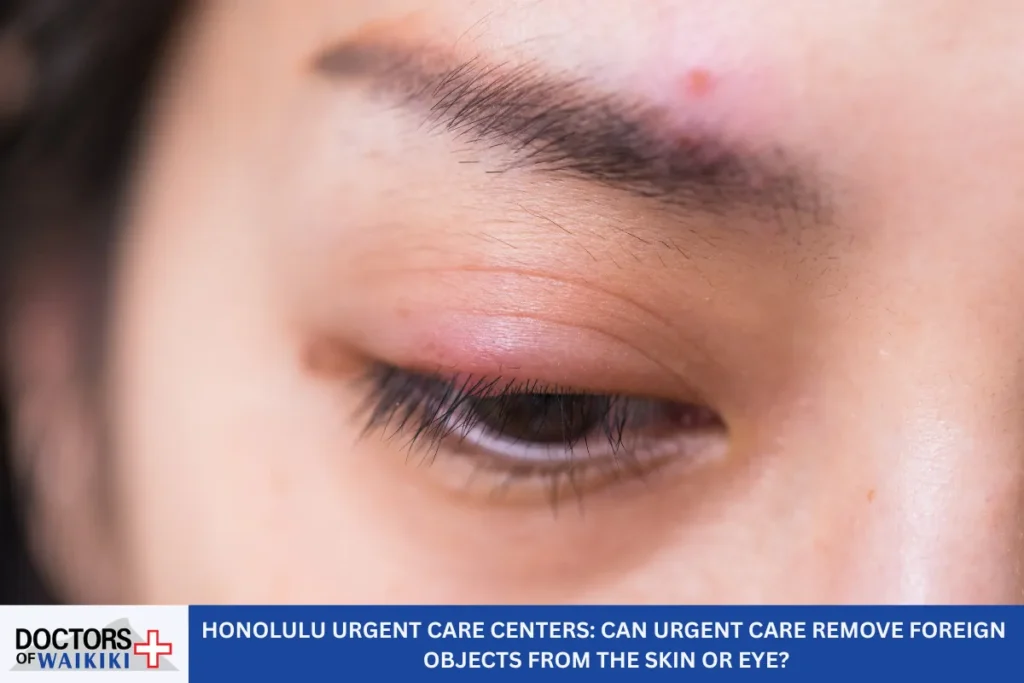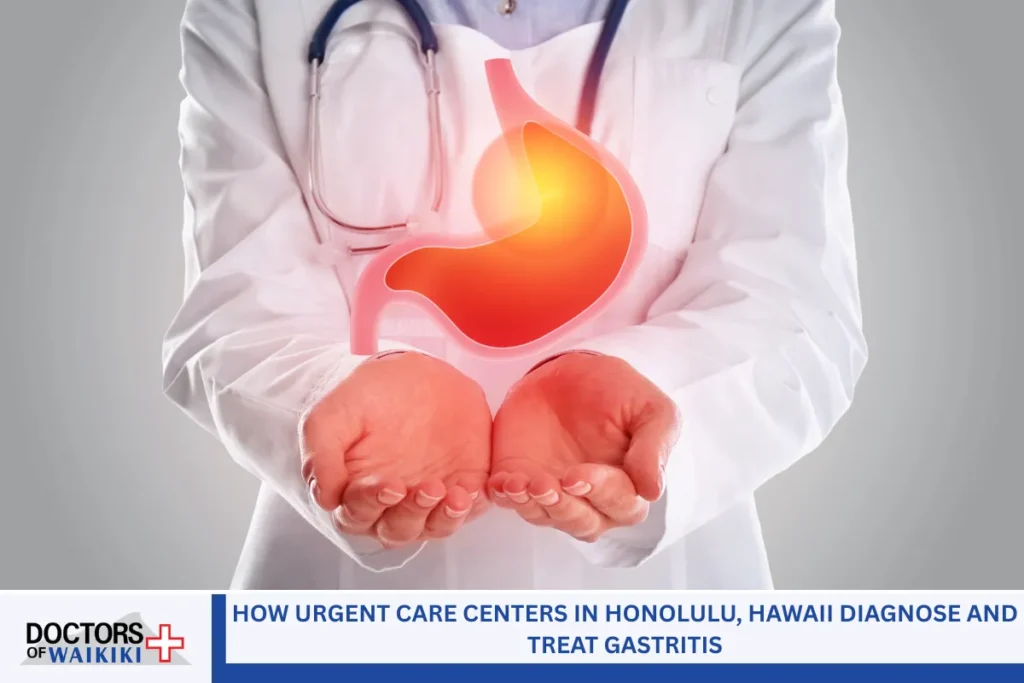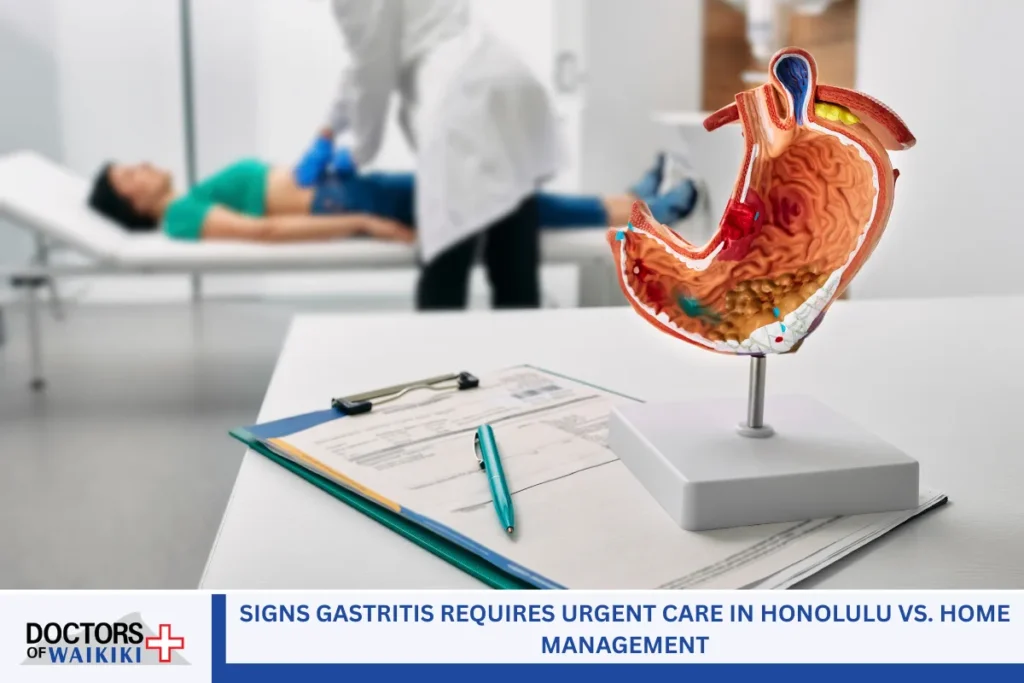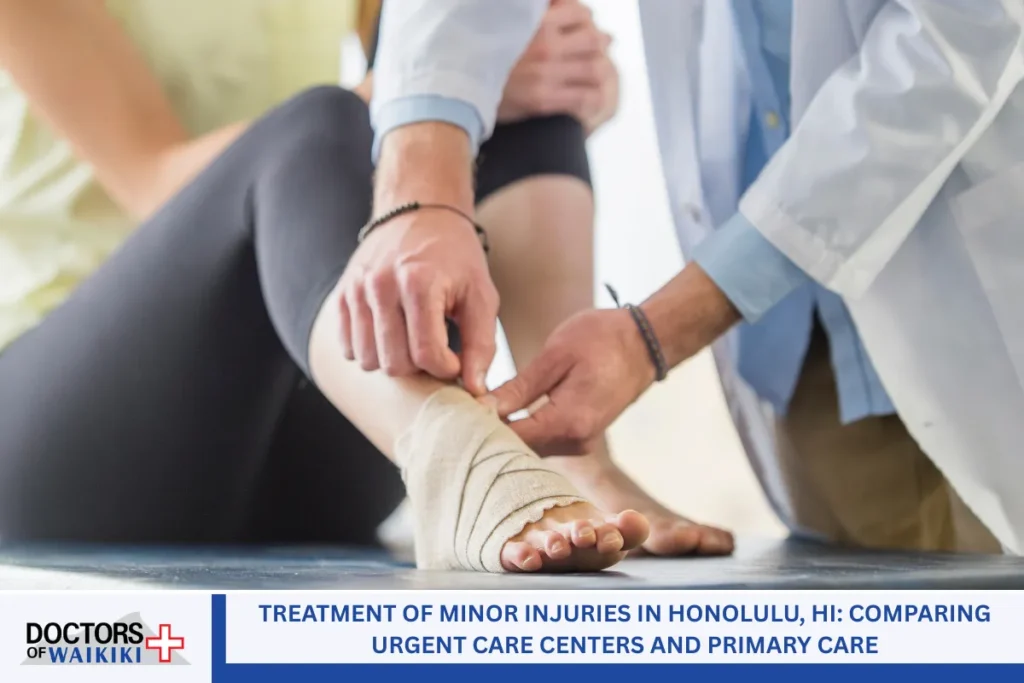Gastritis can strike suddenly, causing stomach discomfort, nausea, or burning pain. For many patients in Honolulu, knowing when to seek an urgent care center can be confusing. Ignoring symptoms may lead to more serious conditions such as peptic ulcers or even stomach cancer. The problem is that many people wait too long before seeking help, hoping the pain will fade. Unfortunately, untreated gastric inflammation can worsen, leaving you in need of urgent medical care. The good news is that you don’t always need to rush to the emergency room. An urgent care center in Honolulu offers immediate care for nonemergency conditions, allowing you to walk in without an appointment, receive diagnostic tests, and get a treatment plan that helps protect your health.
What Is Gastritis and Why It Matters for Your Digestive System
Gastritis refers to inflammation of the stomach lining. This condition can be mild and temporary, or it may progress into chronic medical issues if left untreated. Because the stomach plays a critical role in breaking down food and releasing gastric juices, any disruption can affect the entire digestive system. Patients may experience stomach discomfort, nausea, bloating, or indigestion. In more advanced cases, gastritis can develop into peptic ulcer disease, gastric polyps, or even gastric cancer.
Medical professionals classify gastritis in different forms, including:
- Acute gastritis: Short-term inflammation often triggered by infections, stress, or medications.
- Chronic gastritis: Long-term irritation, which can lead to conditions such as autoimmune atrophic gastritis or intestinal metaplasia.
- Autoimmune gastritis: An autoimmune response where the immune system attacks stomach cells.
Because many gastric diseases share overlapping symptoms, medical consultation at an urgent care clinic can help determine the exact cause and provide proper symptom management.
Recognizing the Common Symptoms of Gastritis
Early detection matters. The symptoms of gastritis often mimic other digestive medical conditions, making it important to seek professional healthcare advice.
Frequent Symptoms Patients Report
- Burning or aching stomach discomfort
- Nausea or vomiting
- Indigestion after meals
- Bloating and a feeling of fullness
- Loss of appetite
- Dark stools (possible sign of stomach ulcer or bleeding)
When Symptoms Should Concern You
While occasional stomach irritation may not be alarming, certain red flags indicate you may need urgent medical care:
- Sharp or severe stomach pain that does not go away
- Blood in vomit or stool
- Ongoing nausea leading to dehydration
- Sudden, unexplained weight loss
- Signs of anemia such as fatigue or dizziness
If these symptoms appear, visiting a walk-in clinic or urgent care facility in Honolulu may be the safest option. Accessible exam rooms, diagnostic equipment, and laboratory testing allow medical providers to quickly rule out life-threatening medical situations while providing immediate care.
The Main Causes of Gastritis and How They Affect Patients
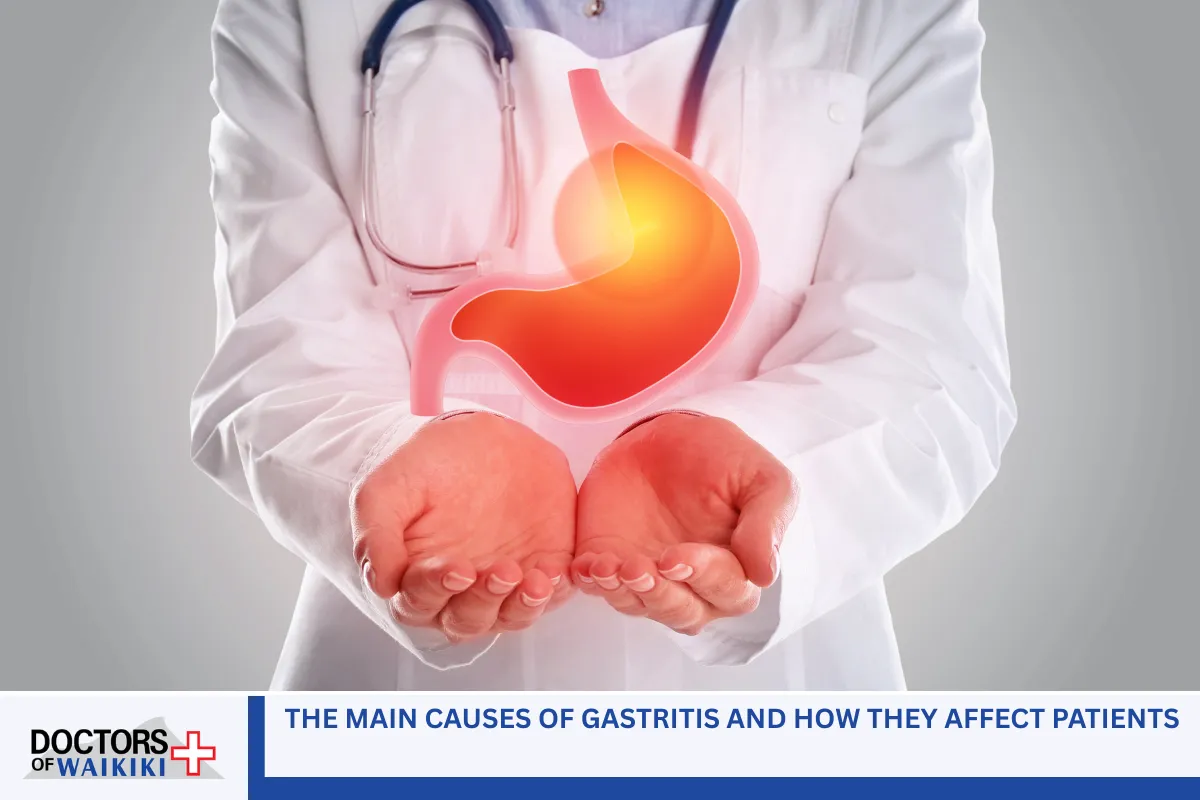
The causes of gastritis vary, but understanding them helps explain both short-term irritation and long-term complications.
Infections and Helicobacter pylori
The most common cause of chronic gastritis is infection with H. pylori. This bacterium damages the stomach lining, leading to inflammation and, in some cases, peptic ulcer disease. A breath test for h. pylori, stool sample, or other non-invasive tests may be ordered at an urgent care clinic to confirm the diagnosis.
Autoimmune Disorders
In autoimmune atrophic gastritis, the body’s immune system mistakenly attacks the cells of the stomach lining. This autoimmune disease can result in vitamin B12 deficiency, intestinal metaplasia, or increased risk of gastric cancer. Patients with autoimmune disorders such as Hashimoto’s disease or Crohn’s disease may have higher risk.
Lifestyle and Medication Use
- Regular use of pain relievers such as NSAIDs can erode the stomach lining.
- Excessive alcohol use irritates the stomach, worsening inflammation.
- Smoking increases acid production and slows healing.
Other Contributing Factors
- Bile reflux, where bile flows back into the stomach from the digestive system.
- Stress, which can heighten gastric juices and lead to stomach ulcers.
- Existing medical conditions such as heart disease or stomach tumors.
When a patient walks in for care, medical providers often consider both natural causes and medical history information to develop a personalized treatment plan.
How Gastritis Is Diagnosed in a Medical Facility
Because gastritis shares symptoms with many other gastric diseases, accurate diagnosis is critical. A walk-in clinic or urgent care facility in Honolulu provides access to modern diagnostic equipment and laboratory testing.
Common Diagnostic Tests for Gastritis
- Breath test for H. pylori – A non-invasive test where patients drink a solution, and their breath is analyzed for signs of infection.
- Stool sample or stool test – Used to detect blood, infection, or other abnormalities.
- Blood tests – To check for anemia, infection, or vitamin B12 deficiency linked to autoimmune gastritis.
- Digital x-ray or imaging – May be ordered to rule out other abdominal medical conditions.
- Endoscopy (referral from primary care physician or urgent care provider) – In some cases, a thin tube with a camera is used to view the stomach lining directly.
Medical professionals, including board-certified doctors, advanced practice providers, nurse practitioners, and medical assistants, often coordinate these tests. Patient care records and lab and test results are stored securely under federal and state privacy regulations, ensuring both accuracy and confidentiality.
Treatment Options for Gastritis and Stomach Inflammation
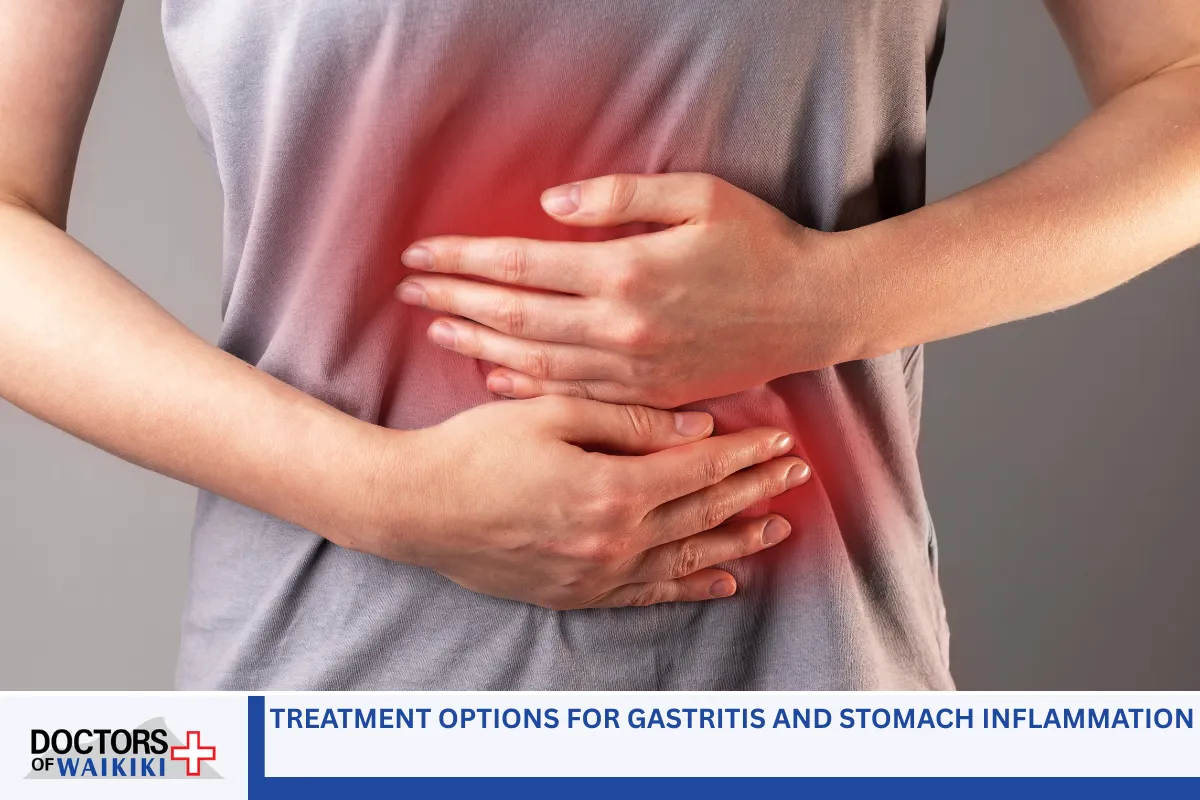
Once diagnosed, treatment focuses on reducing inflammation, healing the stomach lining, and managing symptoms.
Medications Prescribed by Healthcare Providers
- Proton pump inhibitors (PPIs) – Reduce stomach acid and promote healing.
- H2 blockers (H2 histamine blockers) – Lower acid production and ease discomfort.
- Potassium-competitive acid blockers – An emerging treatment option for acid suppression.
- Antibiotics – If H. pylori infection is confirmed through a breath test or stool test.
- Acid blockers and protective medications – Help manage symptoms such as burning pain or nausea.
Lifestyle and Diet Adjustments
Medical providers often recommend changes to reduce irritation, such as:
- Avoiding alcohol, smoking, and spicy foods.
- Eating smaller, more frequent meals to ease digestion.
- Managing stress through relaxation or physical therapy.
- Staying consistent with prescribed medications.
Long-Term Management and Monitoring
Patients with autoimmune atrophic gastritis or autoimmune metaplastic atrophic gastritis may require ongoing medical consultation. Treatment plans may include vitamin supplementation, regular laboratory monitoring, and wellness services to prevent further complications like intestinal metaplasia, gastric polyps, or stomach tumors.
Urgent Care vs. Emergency Room: Where Should You Go?
When experiencing gastric symptoms, many patients struggle to decide whether to visit an urgent care center or the hospital emergency room.
When Urgent Care Services Are Enough
A walk-in clinic or urgent care facility in Honolulu is appropriate for:
- Mild to moderate stomach discomfort
- Persistent nausea and indigestion
- Allergies or overlapping symptoms like runny nose, watery eyes, or nasal congestion that complicate diagnosis
- Suspected H. pylori infections requiring lab tests or stool samples
- Nonemergency conditions that still need immediate care
Urgent care clinics often provide flexible hours of operation, accessible exam rooms, and immediate diagnostic tests without the need for a schedule or appointment. Patients can walk in, receive care from medical professionals, and often save time compared to the emergency department.
When the Emergency Department Is Necessary
Some cases require emergency medicine physicians at a hospital:
- Severe bleeding in vomit or stool
- Intense, sudden stomach pain that may indicate stomach ulcer rupture
- Difficulty breathing or fainting spells
- Signs of a life-threatening medical situation such as perforation of the stomach lining
If you are unsure, healthcare providers and staff at a walk-in clinic can guide you. They may refer you to the hospital emergency room if advanced intervention is required.
The Role of Urgent Care Clinics in Honolulu for Gastritis
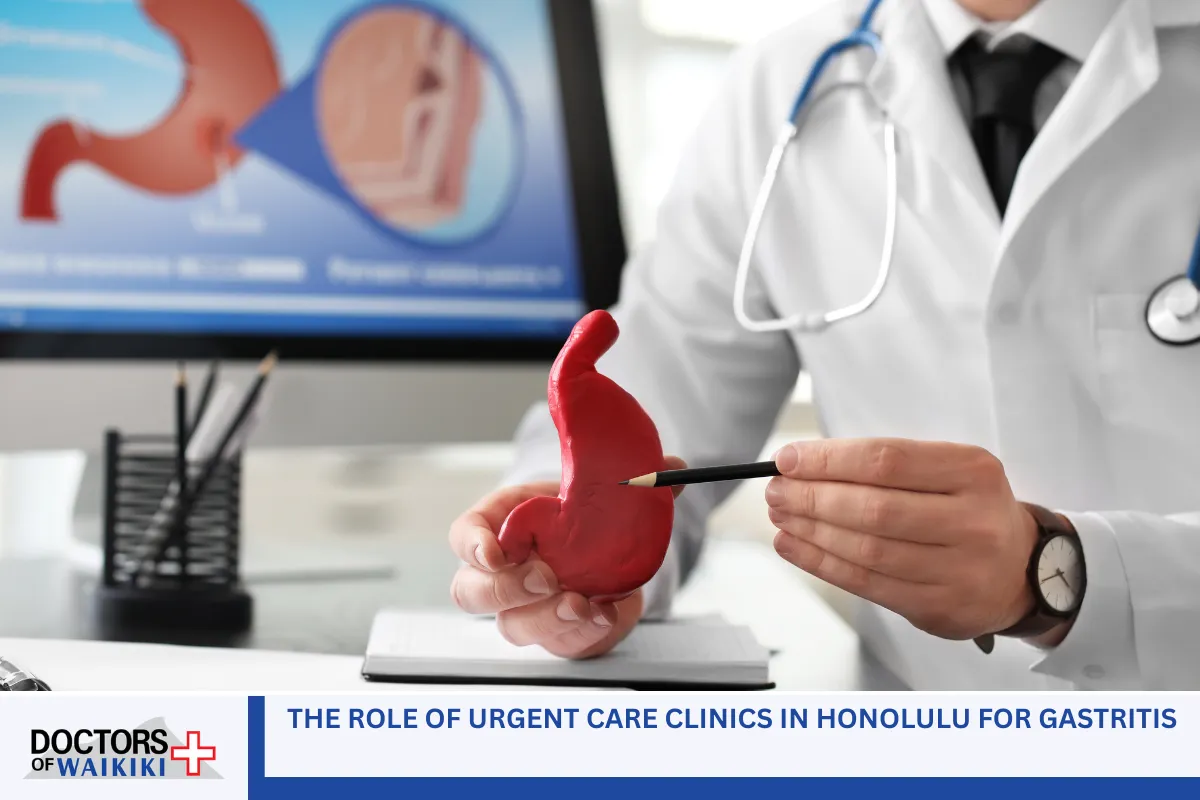
Urgent care options provide more than just immediate symptom management. They bridge the gap between primary care providers and the hospital emergency room, ensuring patients receive timely treatment.
Services Beyond Gastritis Treatment
Most urgent care clinics in Honolulu also offer:
- COVID-19 testing and immunizations
- Occupational health and workers comp injury treatment
- Allergy testing, allergy relief, and allergy symptoms and treatments
- Physical therapy and wellness services
- Immigration physicals, vaccination records, and biometric testing
- Setting and casting broken bones through orthopedic urgent care
- Sore throat care, lab tests, and diagnostic tests for other medical issues
Why Families Choose Walk-In Care
For many families, urgent care centers provide accessible healthcare without the long wait times of traditional primary care visits. Patients benefit from:
- Walk in convenience with no appointment required
- Coverage through most insurance plans, with options for payment in full if needed
- Immediate care for minor to moderate medical issues
- A medical team that includes nurse practitioners, medical assistants, and board-certified doctors working together
By visiting an urgent care clinic, patients not only address stomach inflammation but also gain access to a full spectrum of healthcare services that support long-term well-being.
Advanced Treatments and Follow-Up Care for Gastritis
When patients visit an urgent care center in Honolulu, the immediate goal is symptom relief and identifying the underlying cause. For many, prescription medications like proton pump inhibitors or H2 blockers resolve short-term discomfort. But advanced treatment may be required for chronic conditions.
Specialized Treatment Plans
- Autoimmune gastritis management – Medical providers monitor vitamin deficiencies, particularly B12, and manage immune response issues.
- Peptic ulcer disease – Patients diagnosed through stool test or breath test for h. pylori may need longer antibiotic courses.
- Gastric polyps or tumors – If discovered, patients are referred to a primary care physician or gastroenterology specialist for further care.
Urgent care services often include digital x-ray capabilities, laboratory testing, and medical consultation that make early detection possible. A coordinated treatment plan helps prevent progression to gastric cancer or other serious gastric diseases.
Preventing Gastritis and Protecting Your Digestive Health
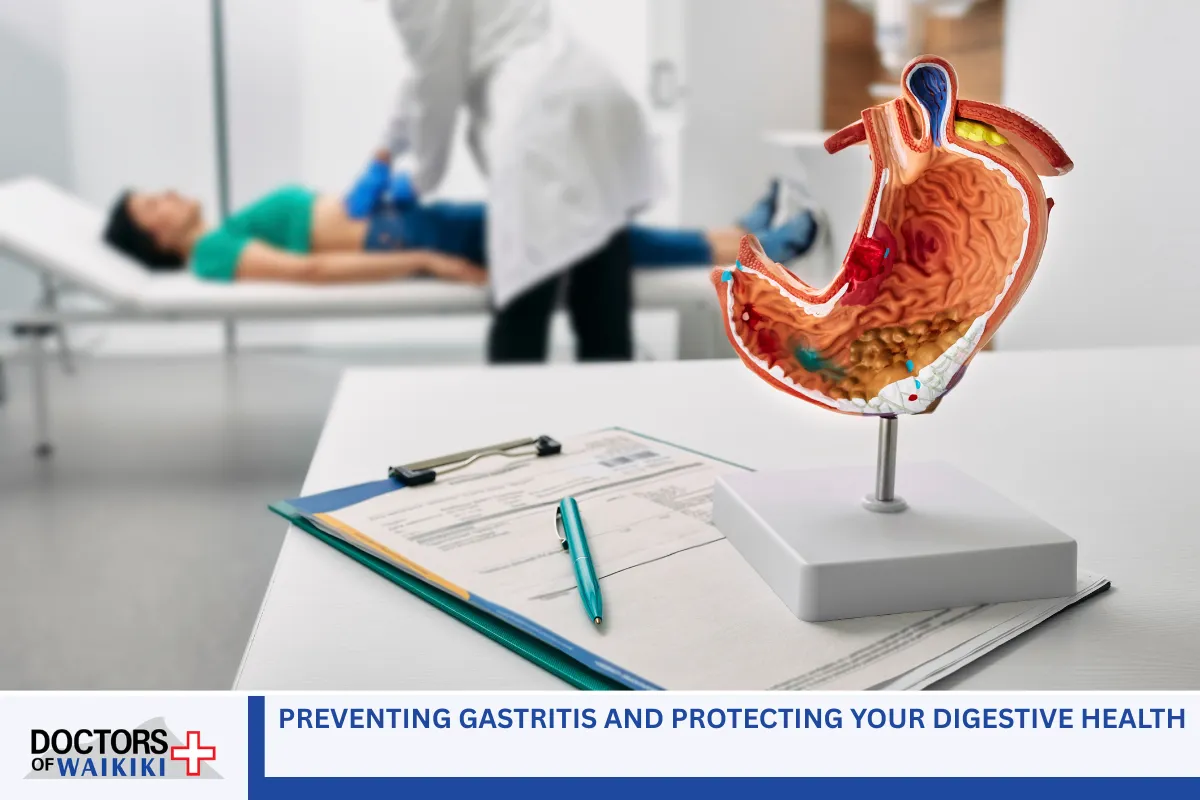
While some causes of gastritis cannot be avoided, such as autoimmune disorders, many risk factors can be managed with lifestyle changes. An urgent care center is not only for immediate relief but also a place for preventive healthcare and wellness services.
Lifestyle Adjustments Recommended by Medical Professionals
- Limit alcohol and tobacco use to reduce stomach lining irritation.
- Avoid overuse of NSAIDs or consult your primary care provider about safer options.
- Manage stress through exercise, physical therapy, or relaxation techniques.
- Maintain healthy eating habits and avoid foods that trigger stomach discomfort.
Routine Preventive Services Available at an Urgent Care Center
- Immunizations and vaccination records to prevent infections that can worsen digestive system issues.
- Biometric testing and lab tests to track long-term wellness.
- Allergy testing for patients with overlapping allergy symptoms and treatments, including runny nose or watery eyes.
- TB blood test, syphilis and gonorrhea screening, and COVID-19 testing as part of comprehensive patient care.
These services help patients manage their overall health, reducing the chances of gastric inflammation linked to other medical conditions.
Why Honolulu Residents Rely on Urgent Care Centers for Gastritis
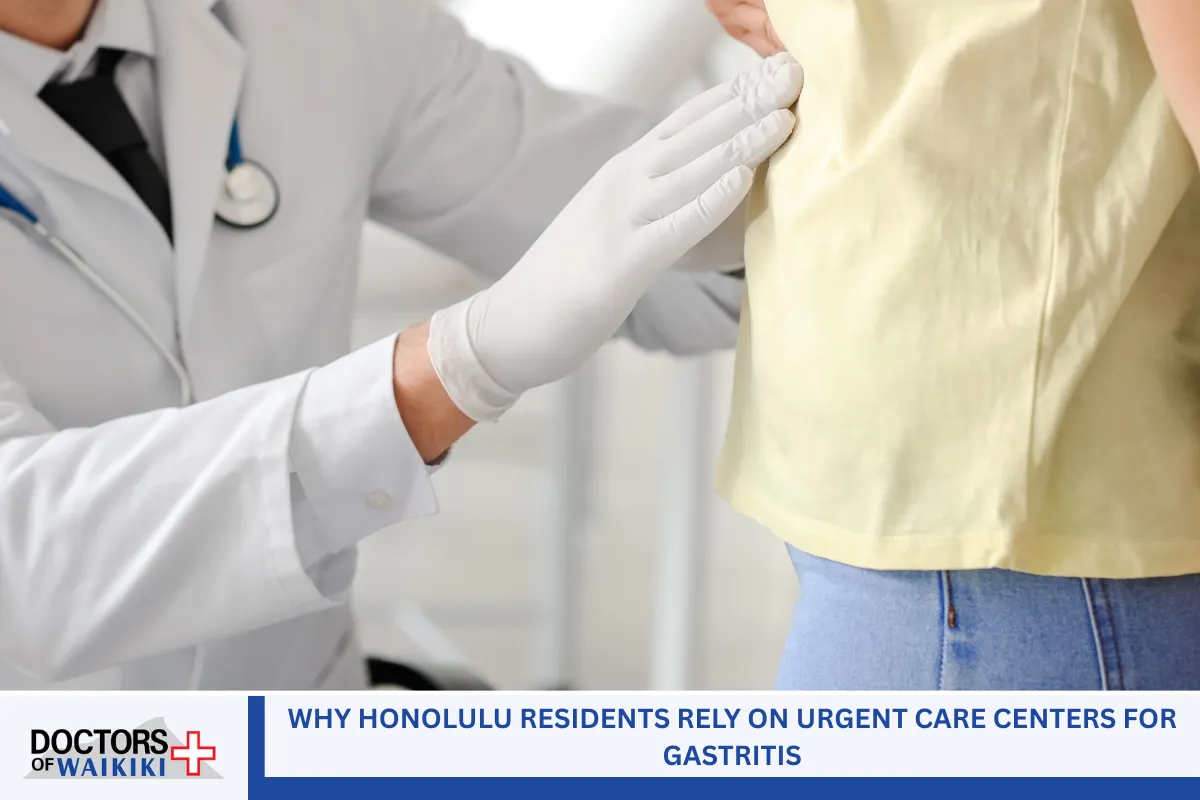
When dealing with medical issues like gastritis, patients in Honolulu have several healthcare options. Yet many choose an urgent care center over waiting weeks for a primary care appointment or spending hours in a hospital emergency room.
Advantages of Choosing an Urgent Care Center
- Accessibility – With convenient hours of operation and walk-in care, patients don’t need to schedule an appointment in advance.
- Comprehensive urgent medical care – From diagnostic tests to immediate treatments, urgent care centers cover both minor to moderate medical issues.
- Affordability – Visits are often less costly than the emergency department, especially when using medical insurance cards or paying in full.
- Experienced medical team – Nurse practitioners, medical assistants, and board-certified doctors collaborate to provide quality healthcare.
- Broad range of urgent care options – Beyond gastritis, patients can access orthopedic urgent care, occupational health, allergy relief, and wellness services.
Honolulu-Specific Benefits
Urgent care centers in Honolulu are designed with patient convenience in mind:
- Accessible exam rooms suitable for families and individuals.
- Immediate care even during inclement weather when primary care offices may be closed.
- Diagnostic equipment such as digital x-ray machines and laboratory facilities onsite.
- Customer service teams to help patients find a physician or primary care provider for follow-up.
This combination of immediate care and long-term health support makes urgent care clinics the best urgent care option for many residents.
When Gastritis Becomes a Medical Emergency
Although most gastritis cases can be treated at an urgent care center, patients must recognize when symptoms point to a life-threatening medical situation.
Emergency Red Flags
- Severe bleeding or black, tarry stools
- Vomiting blood that resembles coffee grounds
- Intense, sudden stomach pain that worsens rapidly
- Symptoms of shock such as fainting, cold sweats, or confusion
In these cases, patients should go directly to a hospital emergency room. Emergency medicine physicians and advanced-practice providers are equipped to handle life-threatening gastric complications.
Urgent care providers may also transfer patients if they identify signs of medical emergency during a consultation. This collaboration between urgent ambulatory care centers and hospitals ensures patient safety.
Building a Path Toward Recovery and Wellness in Honolulu
Gastritis doesn’t have to control your life. By visiting an urgent care center in Honolulu at the first signs of stomach inflammation, you can access immediate diagnostic tests, symptom management, and a tailored treatment plan. Whether caused by H. pylori infection, autoimmune disease, or lifestyle factors, timely medical care prevents minor medical issues from becoming serious gastric diseases.
For families, an urgent care center doubles as a reliable walk-in clinic offering comprehensive services beyond gastritis treatment—such as allergy testing, immunizations, orthopedic urgent care, physical therapy, and wellness services. Patients benefit from the expertise of healthcare providers and staff who put safety, privacy, and recovery first.
If you’re experiencing stomach discomfort, don’t wait for it to worsen. Walk in today, consult with experienced medical professionals, and take advantage of the urgent care options available across Honolulu. Protect your digestive system, restore your health, and trust that immediate care is just around the corner.
Urgent Care Center in Honolulu, Hawaii — Doctors of Waikiki
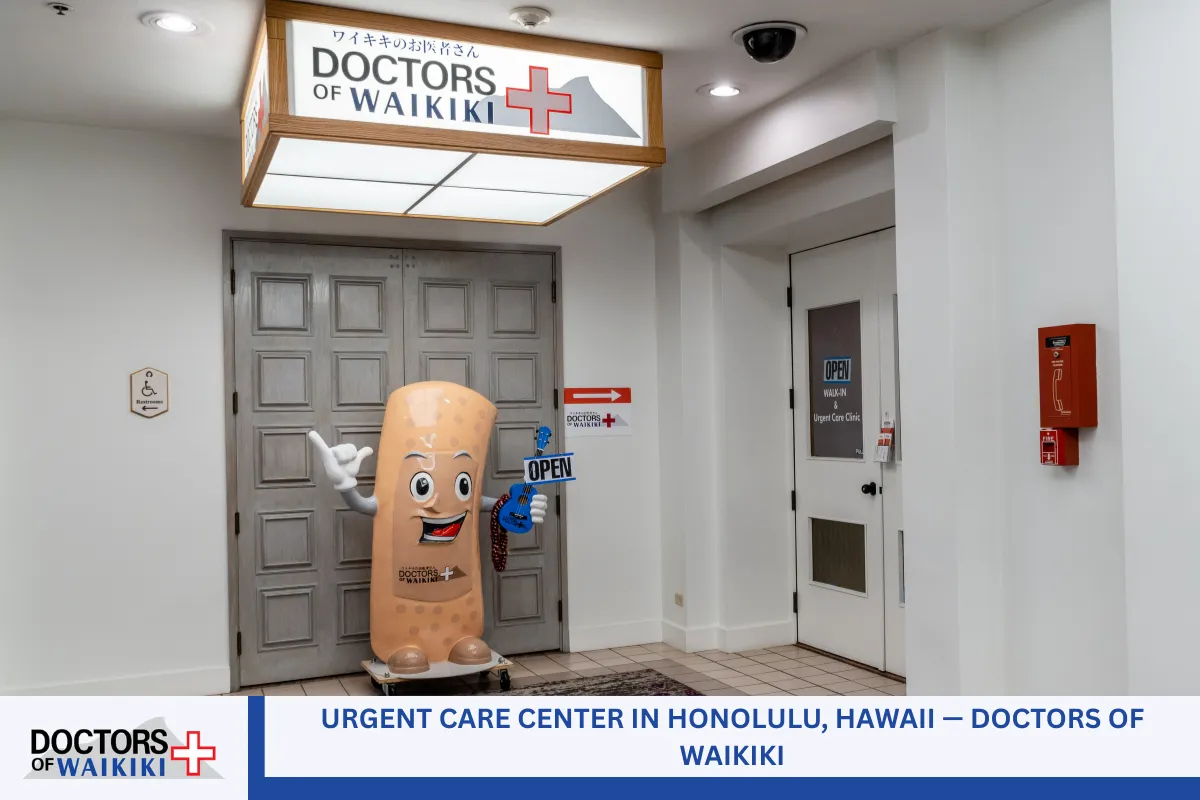
If you’re experiencing stomach pain, nausea, or other gastritis symptoms, Doctors of Waikiki is your trusted urgent care center in Honolulu, Hawaii. Our experienced medical team provides prompt evaluation and treatment for all causes of gastritis, from infections to stress-related flare-ups. Skip the long emergency room wait—just walk in or schedule an appointment online. We offer advanced diagnostics, effective treatment plans, and caring support every step of the way. Conveniently located for Honolulu and surrounding areas, we help you get fast relief and peace of mind. Call (808) 922-2112 or fill out our contact form today for immediate help from a reliable urgent care center. Get the care you deserve—quickly and compassionately.
Frequently Asked Questions
1. What are the main symptoms of gastritis that require urgent care?
Gastritis often causes symptoms like stomach pain, nausea, vomiting, loss of appetite, and bloating. If you notice severe abdominal pain, persistent vomiting, vomiting blood, black stools, or high fever, you should visit an urgent care center immediately. These symptoms may indicate a serious condition, such as bleeding or an ulcer, which requires fast medical attention. At Doctors of Waikiki, our urgent care team can quickly assess your situation, perform necessary diagnostic tests, and provide a treatment plan or refer you to a specialist if needed. Early care helps prevent complications and ensures the best outcome for your health.
2. What causes gastritis and how is it diagnosed at an urgent care center?
Gastritis is often caused by infection (like Helicobacter pylori), regular use of NSAIDs, excessive alcohol, stress, or autoimmune conditions. When you visit Doctors of Waikiki’s urgent care center, our providers review your symptoms, medical history, and risk factors. Diagnosis may involve a physical exam, lab tests (such as blood work or stool tests), and sometimes imaging. Early diagnosis is important for effective treatment and to rule out more serious conditions. Our urgent care center in Honolulu is equipped with modern diagnostic tools and experienced staff to guide you toward a full recovery.
3. How is gastritis treated at Doctors of Waikiki’s urgent care center?
Treatment for gastritis at our urgent care center is based on the underlying cause. Most cases are managed with medications to reduce stomach acid, antibiotics for bacterial infections, and lifestyle advice to avoid triggers like certain foods or alcohol. Our medical team may recommend dietary changes and stress management, and we provide follow-up care instructions to ensure your symptoms resolve. Severe cases may require further investigation or referral to a specialist. Doctors of Waikiki focuses on fast, patient-centered care to relieve your symptoms and support long-term health.
4. Do I need an appointment for gastritis treatment at Doctors of Waikiki?
No appointment is necessary—you can walk in anytime during our operating hours for urgent care. However, for your convenience, you may also schedule a visit online or by phone. Our urgent care center is designed for quick access, with short wait times and efficient service. Whether you’re a Honolulu resident or visitor, we strive to make getting quality medical care easy and stress-free. Walk in or call us at (808) 922-2112 for immediate attention to your gastritis symptoms.
5. What insurance plans are accepted, and how can I prepare for my visit?
Doctors of Waikiki accepts most major insurance plans, and we also offer self-pay options for uninsured patients. Before your visit, bring your insurance card, a photo ID, and a list of any current medications or allergies. If you have recent medical records or test results, bringing them can help us provide even better care. Our billing staff will answer your insurance questions and explain any out-of-pocket costs before treatment. We believe urgent care should be accessible, transparent, and focused on your health needs every step of the way.

